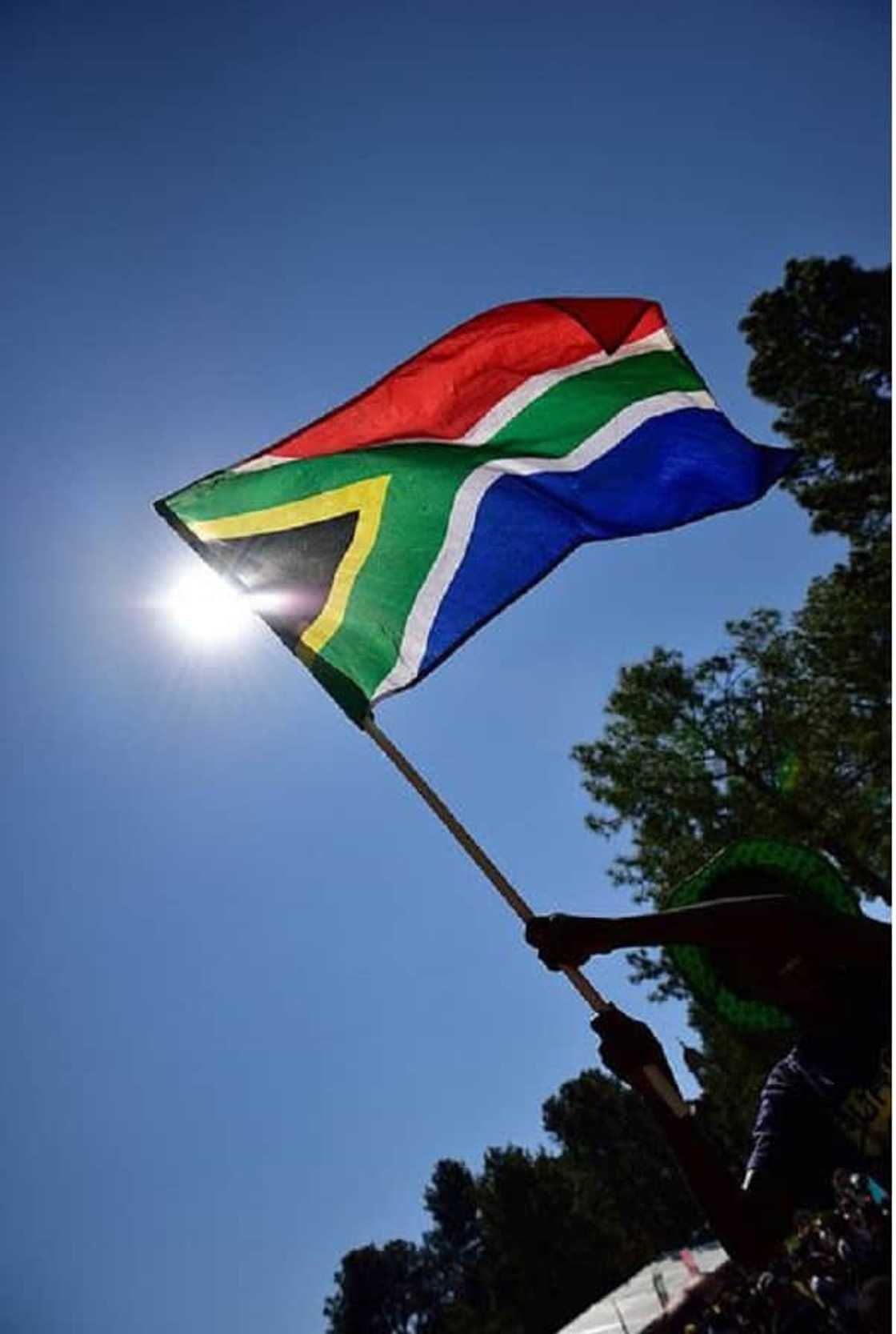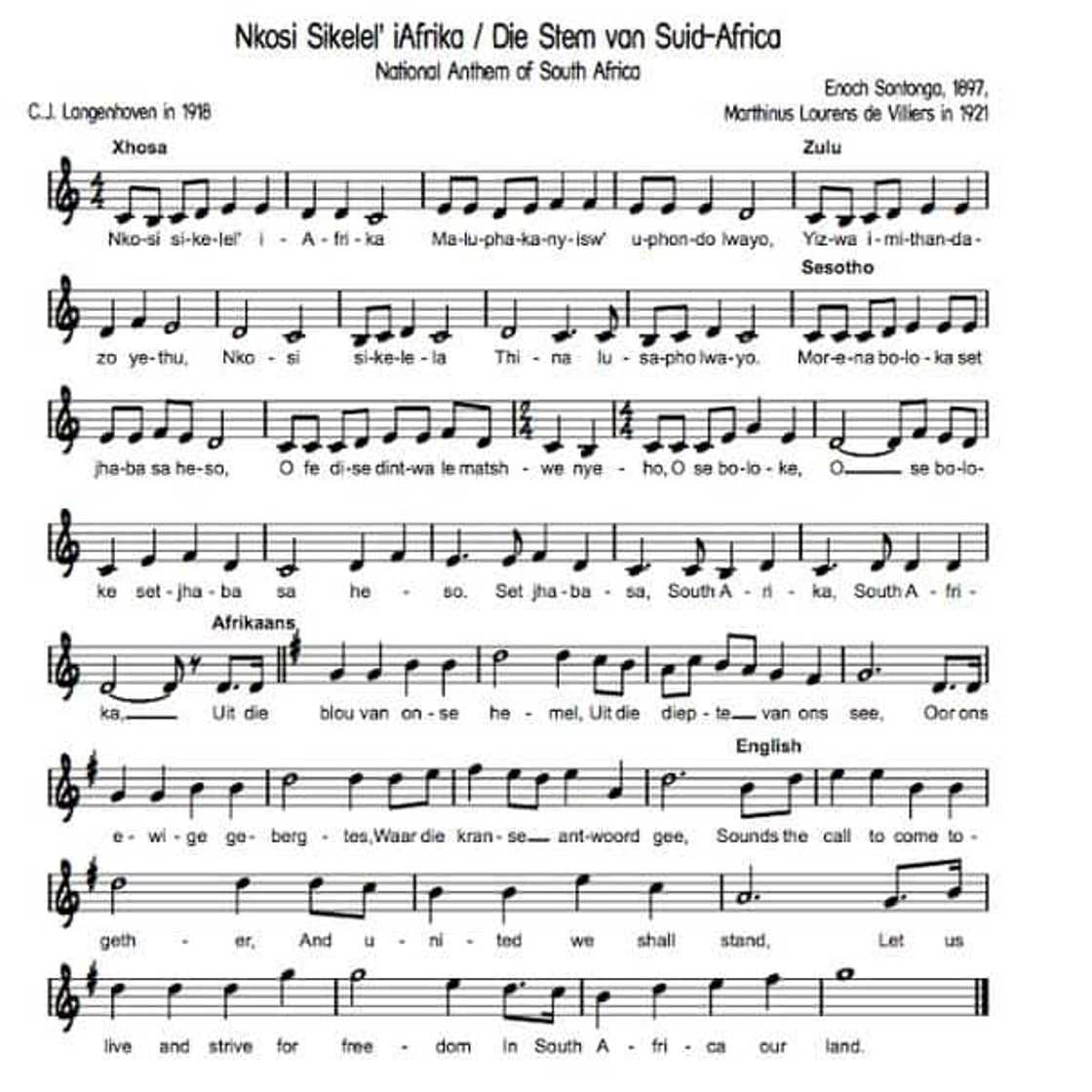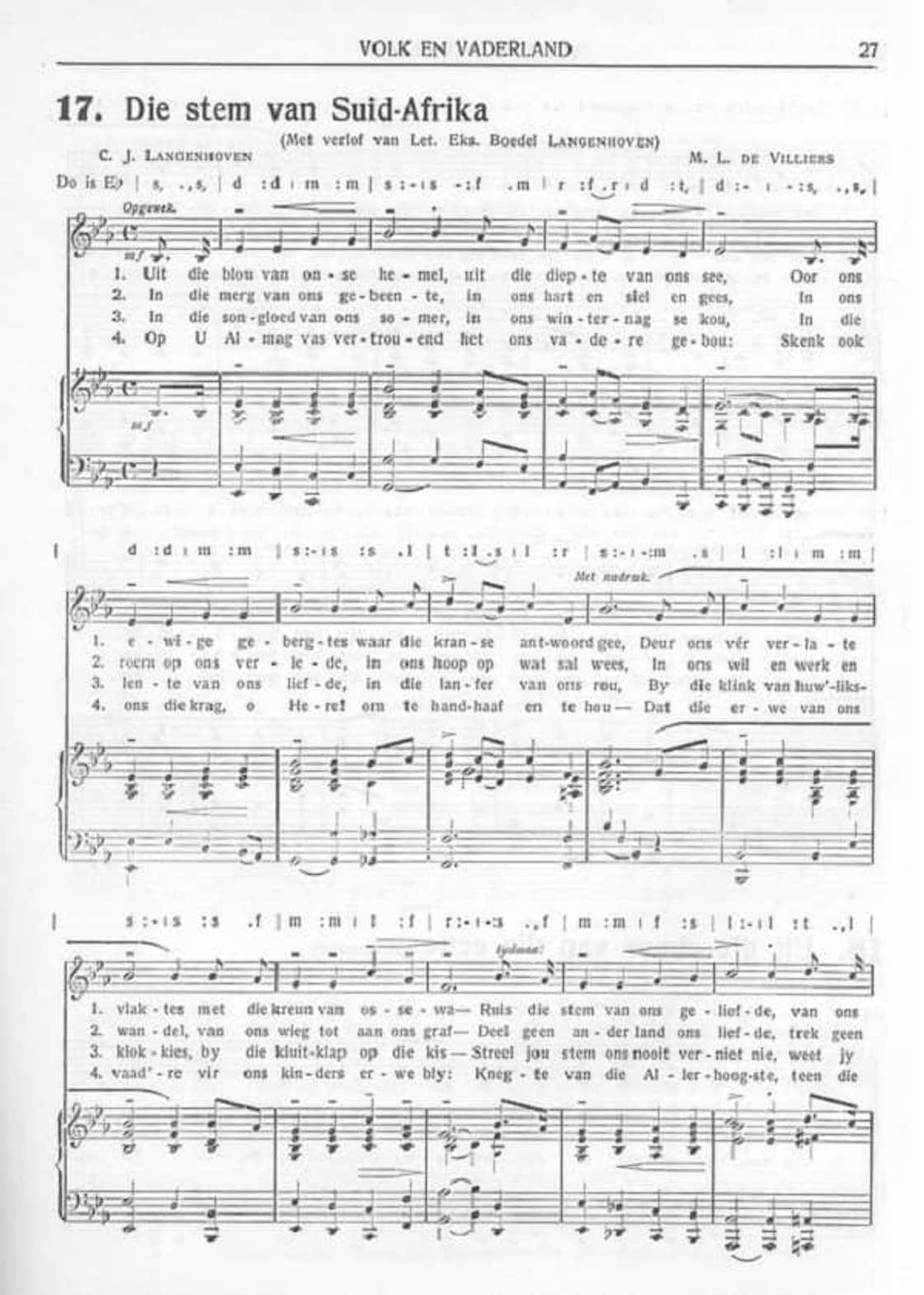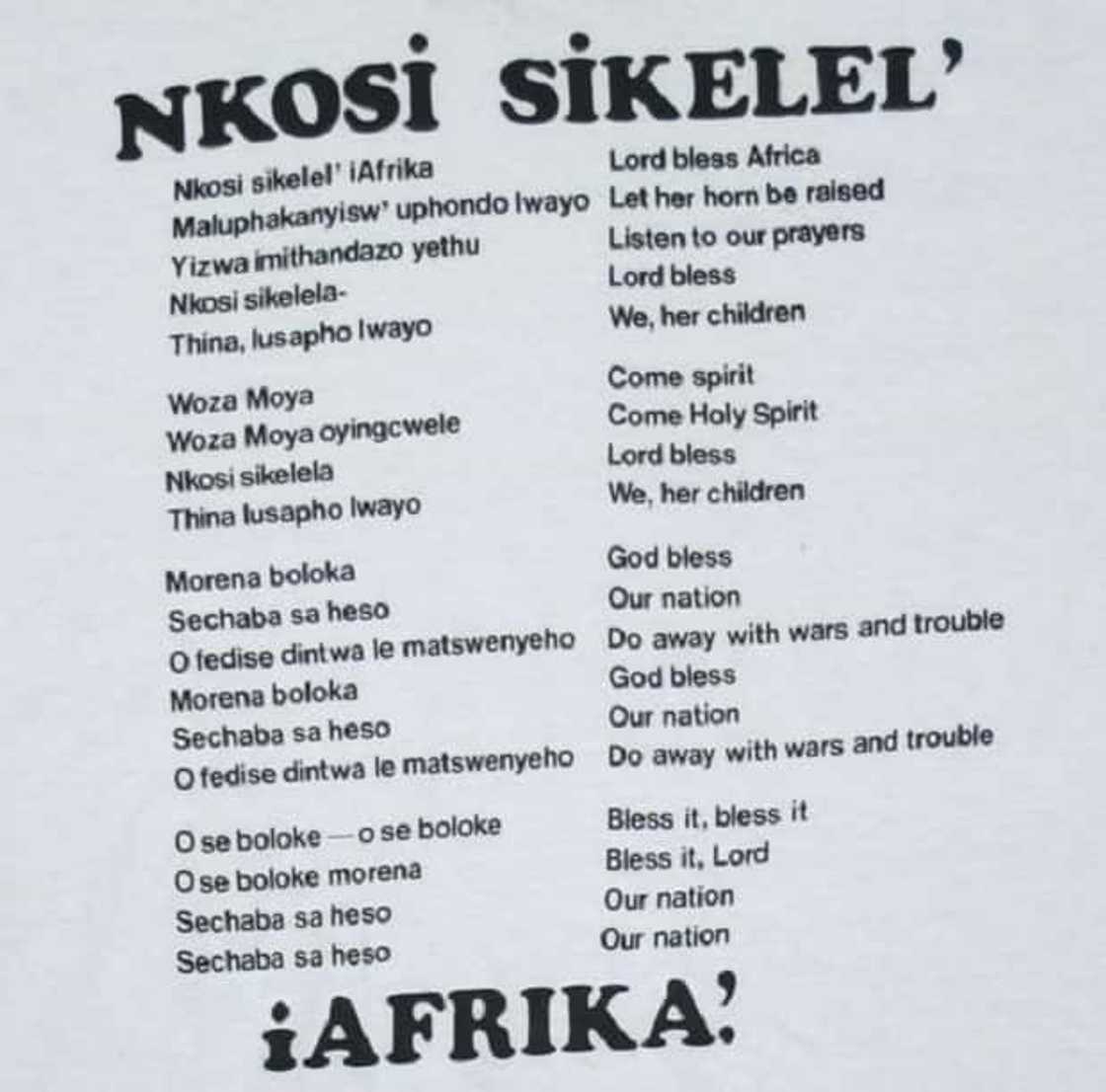Nkosi meaning: Exposing the true meaning of the word and whether it is linked to idolatry
The South African national anthem is one of the symbols of national unity; hence, it is one of the factors that bring about the aspect of equality in the country, regardless of your social background. The national anthem has been in existence for years and has gone through transformations. It originates from Nkosi Sikelel iAfrika, a song that was once a poem. It is therefore necessary to be knowledgeable on what the national anthem stands for and Nkosi meaning.

Source: UGC
The national anthem of South Africa is a combination of two songs; Die "Stem van Suid-Afrika" and "Nkosi Sikelel iAfrika". Die "Stem van Suid-Afrika" was the first song that was used as the national anthem. The government, later on, saw a reason for combining the two songs and with due time, the legal procedures were followed, and the two songs made the national anthem. The intended message in the song is calling for the blessings of God upon the country. However, there is an ideology that is going around, that "Nkosi Sikelel iAfrika" is a form of idol worship. Before making any decision on the latter, it will be wise to get enlightened on how the song came to existence and Nkosi meaning.
What does Nkosi Sikelel iAfrika mean in English?
Recently, there has been a message that has been going around social media platforms claiming that the South African anthem Nkosi Sikelel iAfrika relates to a form of idol worship. According to the allegations, Nkosi Sikelel iAfrika is an ancestor worship song to a tree god whose name is Nkosi. The claims further state that the consequences of the idol worship were Shaka Zulu butchering six thousand pregnant women. This ideology has caused panic among the expectant white women, who fear that they will also be slaughtered to mark an end to apartheid.
READ ALSO: South African coat of arms explained in simple terms

Source: UGC
The message that has been going round is in Afrikaans, and it reads; “Ek was onder die indruk dat Nkosi Sikelele Afrika meen: GOD SEËN AFRIKA. Ek het nooit geweet die NKOSI is ‘n ander god waarvan gepraat word nie. HOE HET GOD opgetree teen Israel as hulle begin ander gode aanbid het? Ons is besig met afgodery en ons besef dit nie eers nie. Ons is in die moeilikheid by God.
Nkosi: Uit die gryse geskiedenis van Afrika leer ons reeds dat Nkosi die oudste seun is van Mina Mamo Wê, die vrou wat uit die boom gekom het. Nkosi is die eerste voorvadergees. Om te bid tot Nkosi, om te sing: Nkosi bewaar Afrika wanneer ons voor ‘n rugbywedstryd op aandag staan, is ‘n gruwel voor die aangesig van God. In Levitikus 20 sê Hy uitdruklik: Dit is ‘n gruwel voor die Here om dooies te raadpleeg. Jy mag nie die geeste van gestorwe voorvaders aanroep nie! Ons ondersteuning by geleenthede waar die voorvaders met die sing van hierdie lied vereer word, maak ons aandadig daaraan!
Ons stel ons God gelyk aan Nkosi – die groot voorvadergees.Wat leer die godsdiens van Nkosi? Dit leer Ubuntu. Ek is mens deur ander mense. As dit met my sleg gaan is dit ander mense se skuld. Wanneer Shaka se ma sterf, roep hy die toordokters, die predikers en profete van Nkosi en vra: Wie se skuld is dit dat ek hartseer is? En hulle verklaar dat Nkosi die koning hartseer maak deur die swangerskap van vroue. In een nag van waansin laat Shaka 6000 swanger vroue en dragtige koeie lewend aan stukke kap, omdat hulle die oorsaak van sy hartseer is. Dit leer Nkosi hom. Dis die les wat hy leer van ‘n god wat vandag in ons land voorgehou word as gelykwaardig aan die ware God, nee, inderdaad, as net ‘n ander naam van die Ware God
Nkosi sê: Ek is mens voor ander mense en deur ander mense. As ek vooraan loop, is dit deur die toegewing van ander mense en daarom is ek beter.Die leer van Nkosi is: As hulle wat die sinnebeeld van Apartheid is, doodgemaak is, sal die sonde uitgevee wees. Slag die swanger vroue, want hulle maak my hartseer, sê die koning. Vermoor die boere, want hulle laat my dink aan swaarkry – dis wat gesing word omdat dit geglo word.

Read also
"They deserve R100K a month": School teachers visit top achiever at home with gifts, SA touched
Nkosi sê: Sonde is buite die mens. Maak die ander dood, want hy is die oorsaak van jou sonde. Die sonde kom van buite! Kan u vir u voorstel dat die ware God my sal straf vir ‘n ander se sonde? Dat die ware God ‘n ander mens sal blameer wanneer ek ongehoorsaam is en my dan toestemming sal gee om teen daardie ander mens my te verhef en hom dood te slaan? Nie my God nie! Maar Nkosi sal.Nkosi sik’lele iAfrika, Ma’o phakamiso umkhondo lwayo“God seen Afrika, kom lig die volk op na U…”Letterlik vertaal: “Kom haal ons uit die sonde en neem ons tot by U.”Nkosi-teologie – sonde is ander se skuld, daarom moet die voorvaders se wysheid ons red! Ons aanbid ‘n afgod – en ons weet dit nie !"
South African national anthem
The official version of the South African national anthem is a combination of Nkosi sikelel' iAfrika and Die Stem. According to a historical proclamation that was made in 1994, by the then president; Nelson Mandela, the country would have two national anthems. This proclamation was regarding the provisions of Section 248 (1) together with Section 2 of the Constitution of the Republic of South Africa, No 200 of 1993. This proclamation, therefore, meant that "Nkosi Sikelel iAfrika" and "The Call of South Africa" ("Die Stem van Suid-Afrika) would form the two SA national anthems.
The Call of South Africa ("Die Stem van Suid-Afrika")

Source: UGC
Die "Stem van Suid-Afrika" was initially a poem, written in the early 90s by CJ Langenhoven. Its musical version was, later on, composed by Reverend ML de Villiers in 1921. The song would be played by the South African Broadcasting Corporation every day while closing the broadcasting until the public familiarized with it. The first time that this song was sung in public was during the function of officially hoisting the national flag on May 31st, 1928. On May 2nd, 1957, the government made it official that the song was the official SA national anthem. Later that year, the government went through the legal procedures of acquiring copyright for the song. It was translated to English and allowed for use as the national anthem of South Africa.

Read also
"I'm confused": Wanatu, e-hailing service for Afrikaans drivers, gets mixed responses from SA
Nkosi Sikelel iAfrika meaning
In 1897, Enoch Sontonga, who was a teacher at a Methodist school, composed "Nkosi Sikelel iAfrika." The lyrics of the first stanza of the song were in Xhosa, and they came as a hymn. Later on, Samuel Mqhayi, a poet, added seven more verses to it, and in 1942, Moses Mphahlele published a Sesotho version of the same song.
"Nkosi Sikelel iAfrika" became a popular song since it would be played by Zulu Choir of Reverend JL Dube Ohlange church, every time they had a concert in Johannesburg. The song went from being sang in the church to being sang in political rallies. It was used for defiance, especially when there was apartheid. The first stanza of the song would be sung in either Xhosa or Zulu, while the rest of the song would be sung in Sesotho.
Nkosi Sikelel iAfrika original lyrics

Source: UGC
Nkosi Sikelel iAfrika words were initially in Xhosa and comprised of a single stanza. Seven more verses were added to the song, and later on, it was translated to Sesotho. The final lyrics of the song are a combination of Zulu, Xhosa, and Sesotho. Nkosi Sikelel iAfrika lyrics are;
Nkosi Sikelel’ iAfrika (Lord Bless Africa)
Maluphakanyisw’ uphondo lwayo (May her glory be lifted high)
Yiva imathandazo yethu (Hear our petitions)
Nkosi Sikelela (Lord bless us)
Thina lusapho lwayo (Us your children)
Yihla Moya, (Come Spirit)
Yihla Moya, yihla Moya,
Yihla Moya,
Yihla Moya, yihla Moya,
Yihla Moya oyingcwele (Come Holy Spirit)
Nkosi sikelele (Lord bless us)
Thina lusapho lwayo. (Us your children)
Morena boloka sechaba sa heso, (Lord we ask You to protect our nation)
O fedise dintwa le matshwenyeho, (Intervene and end all conflicts)
Morena boloka sechaba sa heso,
O fedise dintwa le matshwenyeho.
O se boloke, o se boloke, (Protect us)
O se boloke morena se boloke,
Sechaba sa heso (Protect our nation)
Sechaba sa heso
Ma kube njalo! (Let it be so)
Ma kube njalo!
Kude kube ngunaphakade, (Forever and ever)
Kude kube ngunaphakade!
The national anthem is supposed to be a reason for the citizens to put aside their differences and be united. However, the ideology of Nkosi being a god might be reason enough to cause division in the country. Before you choose to believe the ideology, it will be wise for you to make sure that you take some time to go through all the facts.

Read also
Sello Maake kaNcube meets Zizi Kodwa to discuss arts industry, pictures and video attracts SA's attention
READ ALSO:
- 5 intense statements JuJu made that cannot be denied by anyone, white or black
- Apartheid: A (very) brief history
- Opinion: Is Julius Malema a fascist or racial nationalist?
Source: Briefly News




